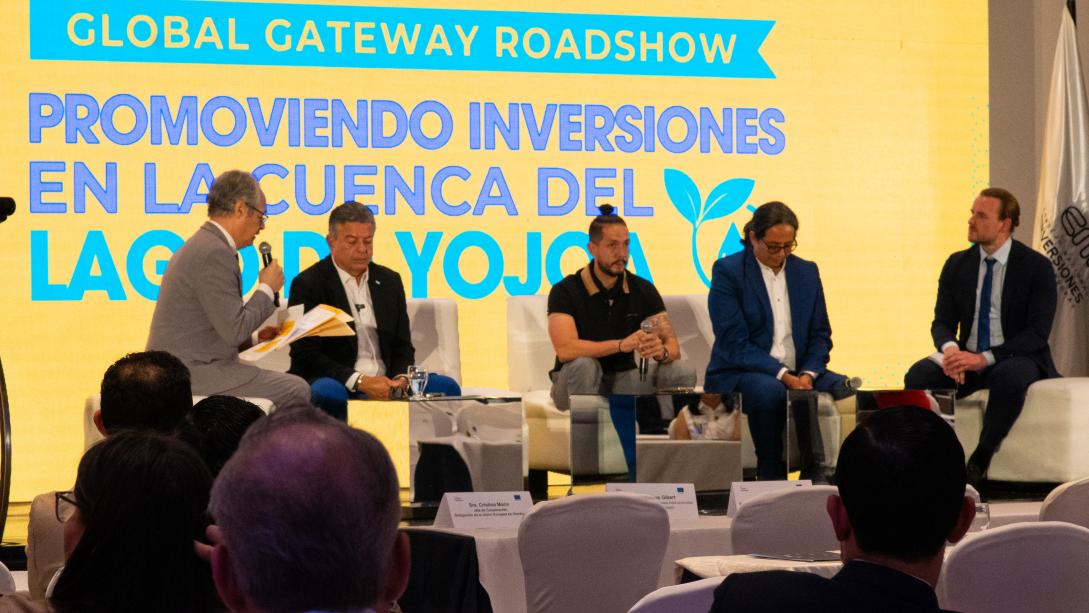Europe connects solutions with Honduras: over $100 million for the sustainable recovery of Lake Yojoa

More than 50 European and Honduran companies gathered at the Global Gateway Road Show, organized by the European Union, to explore investment opportunities in the recovery of the Lake Yojoa basin, one of the most emblematic and threatened ecological areas in Honduras.
This strategic event, held on May 30 in Tegucigalpa, brought together representatives of the Honduran government, the private sector, multilateral financial institutions, and civil society, under the shared conviction that the transformation of Lake Yojoa must combine environmental sustainability, productive innovation, and territorial equity.
During the event, more than $100 million in investment opportunities were announced, including:
- 14 million euros in non-reimbursable cooperation from the EU.
- 41.6 million dollars from CABEI and 38.4 million dollars from KFW for water and sanitation and solid waste management projects.
- 60 million dollars in green loans from the EIB. Grants targeting more than 500 rural households and at least 15 sustainable rural production units.
Likewise, financing lines with green financial products for MSMEs and open calls in areas such as ecological restoration, responsible tourism, and the circular economy were announced.
A European commitment to territorial transformation
“We are all here today because the European Union believes in Honduras,” said Ambassador Gonzalo Fournier during the opening of the event. “This Road Show is a concrete example of our commitment to the country, connecting European companies with green and sustainable investment opportunities, especially in areas of high ecological value such as Lake Yojoa,” he emphasized.
Olga Baus, acting head of the European Commission's DG INTPA Unit for Latin America and the Caribbean, stressed that "the recovery of the lake must be carried out in accordance with the highest social and environmental standards. Circularity and sustainability are not options, they are requirements for transforming this basin into a regional benchmark." She also pointed out that some of the solutions proposed by European companies are already in the tendering phase in other countries, and the first impacts are expected to be seen on the ground in 2026.
For her part, Cristina Marín, head of cooperation for the European Union in Honduras, reaffirmed that “Global Gateway offers real windows of opportunity for efforts to be aligned with concrete solutions. Our goal is for the recovery of the lake to be sustainable and for communities to be protagonists of this change.”
From the lake to the country: a new development model
The recovery of Lake Yojoa and its conservation as a strategic ecosystem for the climate, wildlife, and local communities are mandatory elements under the RAMSAR site declaration, which positions it as a wetland of international importance due to its ecological value and biodiversity.
Also recognized as part of the country's environmental, cultural, and productive heritage, the lake has become one of the flagship initiatives of the Global Gateway strategy in Honduras. The roadmap includes actions in territorial governance, resilient infrastructure, community strengthening, and the development of sustainable value chains in tourism, agriculture, livestock, and forestry.
During the event, technical panels, thematic sessions, and spaces for dialogue were held between European and Honduran companies specializing in water management, solid waste, clean energy, agricultural technologies, and the circular economy.
In the words of the EU Delegation: “The sustainable transformation of Lake Yojoa is not an isolated effort, but a call to build a new model of territorial development from the environmental heart of Honduras.”
Business links and next steps

EU
The Road Show made it possible to identify preliminary partnerships and highlight a concrete offer of projects with impact. Tenders, calls for proposals, and grants targeting different elements of the action are currently active, and the first actions in the field are expected to begin implementation in 2026.
The European Union reaffirms its commitment to the sustainable development of Honduras through the Global Gateway initiative. In the words of Ambassador Fournier: “Everything about Honduras interests us, and nothing about Honduras is foreign to us.”
------------------------------------------------------
What is the Global Gateway initiative?
Global Gateway is a European initiative that promotes investment in sustainable projects, taking into account the needs of partner countries by linking the public and private sectors to generate investments that benefit people and the planet, without creating dependencies.
Promoting sustainable and inclusive development, Global Gateway brings together the European Union, its Member States' development agencies, and its financial and development institutions, including the European Investment Bank (EIB). Key to the approach is mobilizing the private sector to achieve transformative impact. EU delegations around the world play a key role in identifying and supporting Global Gateway projects in partner countries.
The EU not only offers favorable financial conditions to its partners, providing grants, concessional loans, and budgetary guarantees to reduce investment risk and improve debt sustainability, but will also promote the highest standards of environmental, social, and strategic management. The EU will provide technical assistance to partners to improve their capacity to prepare and implement infrastructure projects that ensure value for money.
Global Gateway will invest in stability and international cooperation and demonstrate how democratic values offer certainty and fairness for investors, sustainability for partners, and long-term benefits for people around the world.
Through Global Gateway, the European Union and Honduras are connecting people, communities, institutions, and countries to build a sustainable future.
More details on Global Gateway: Global Gateway Initiative
